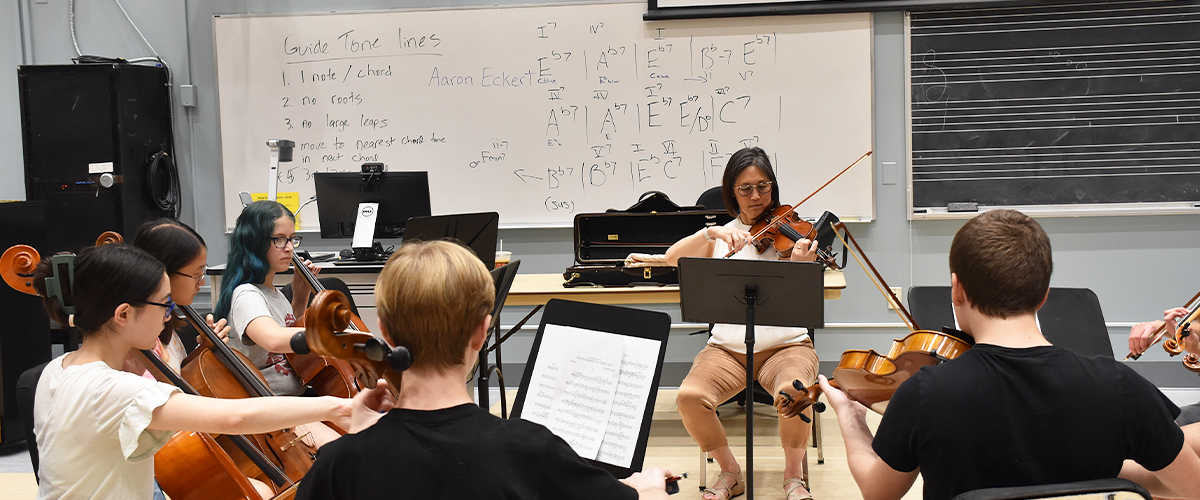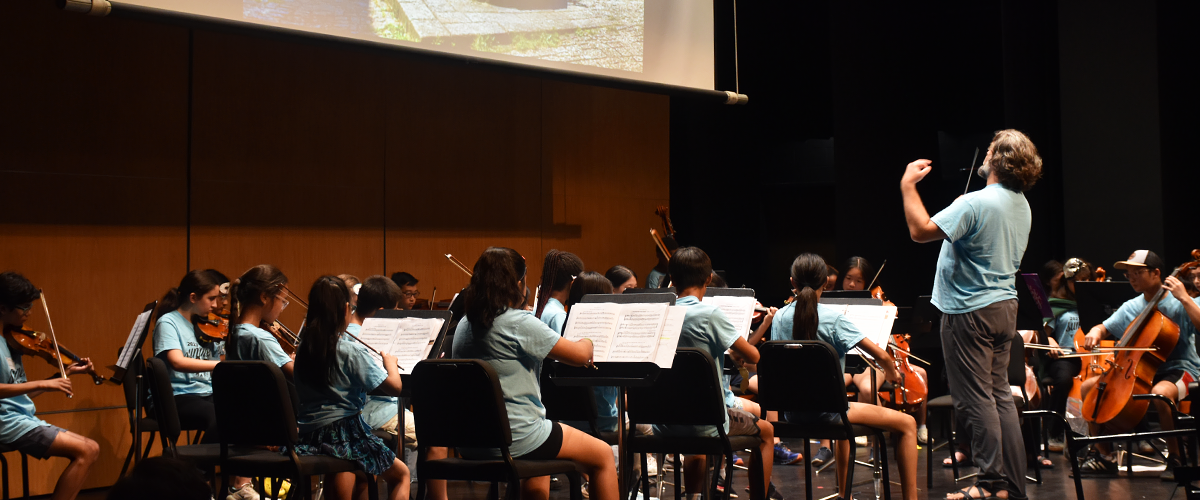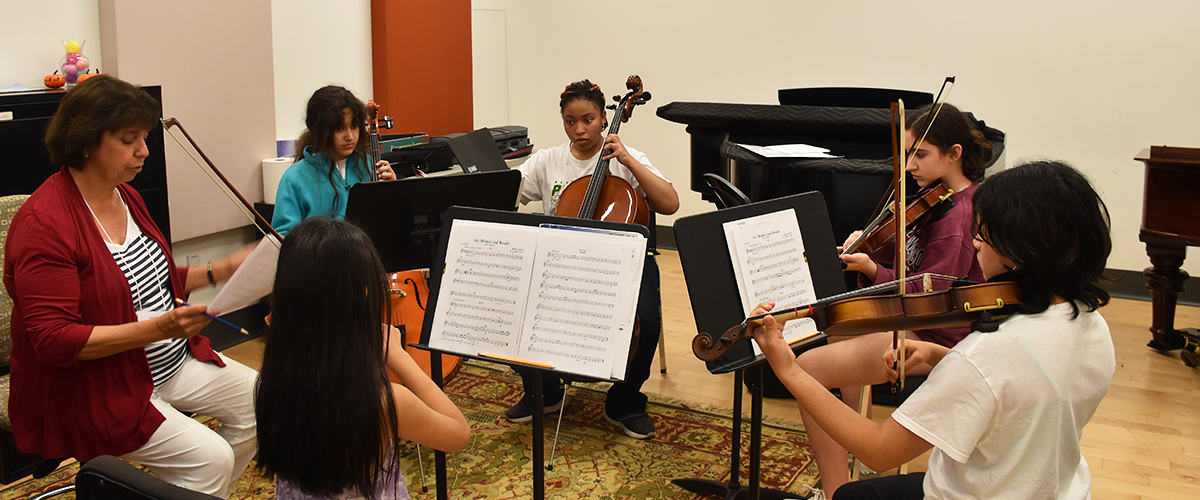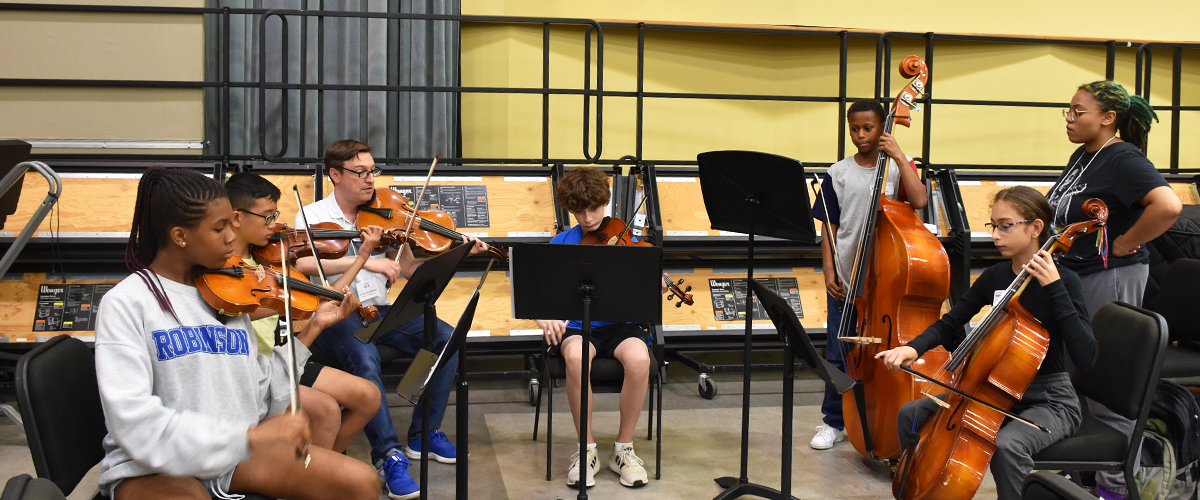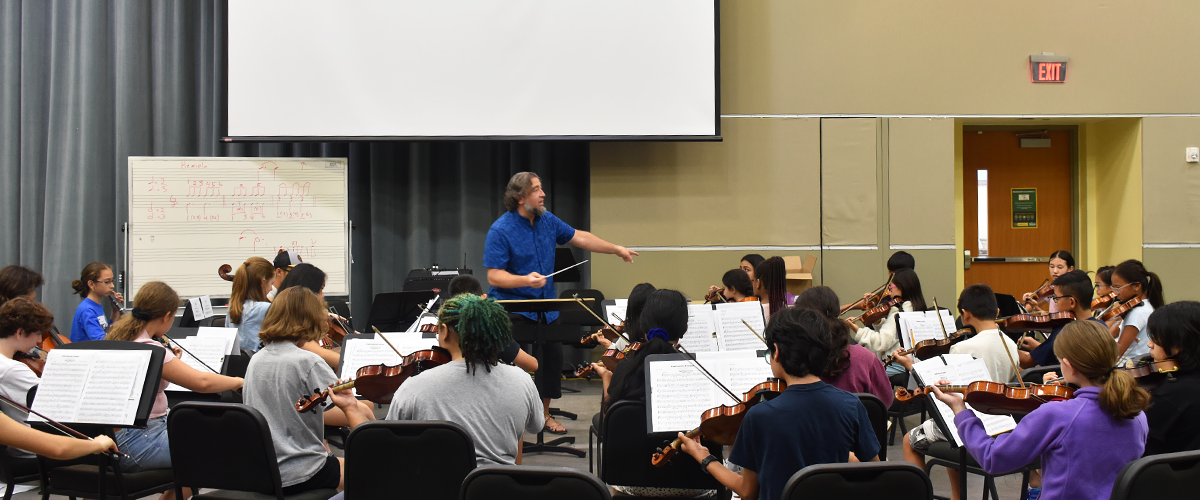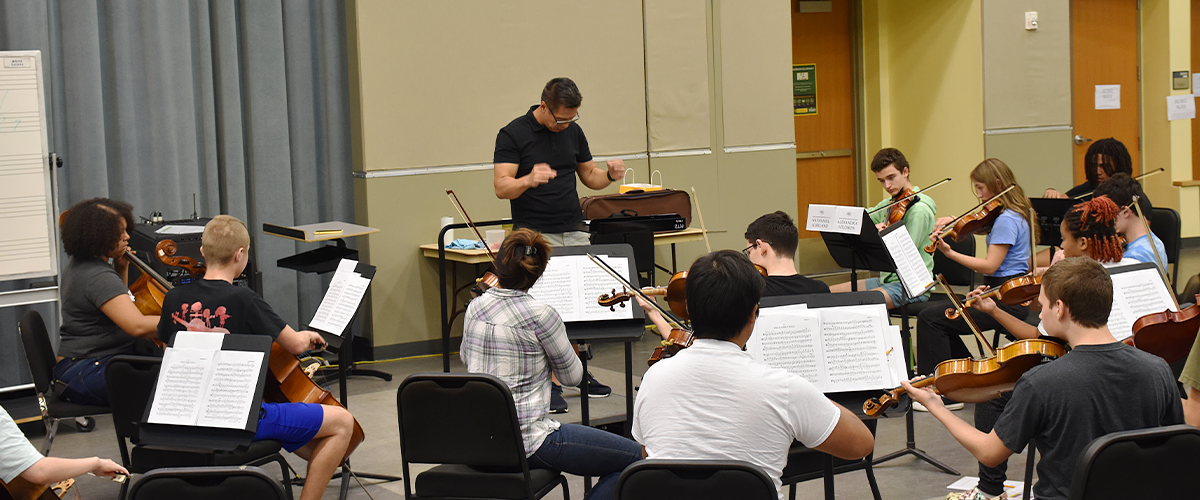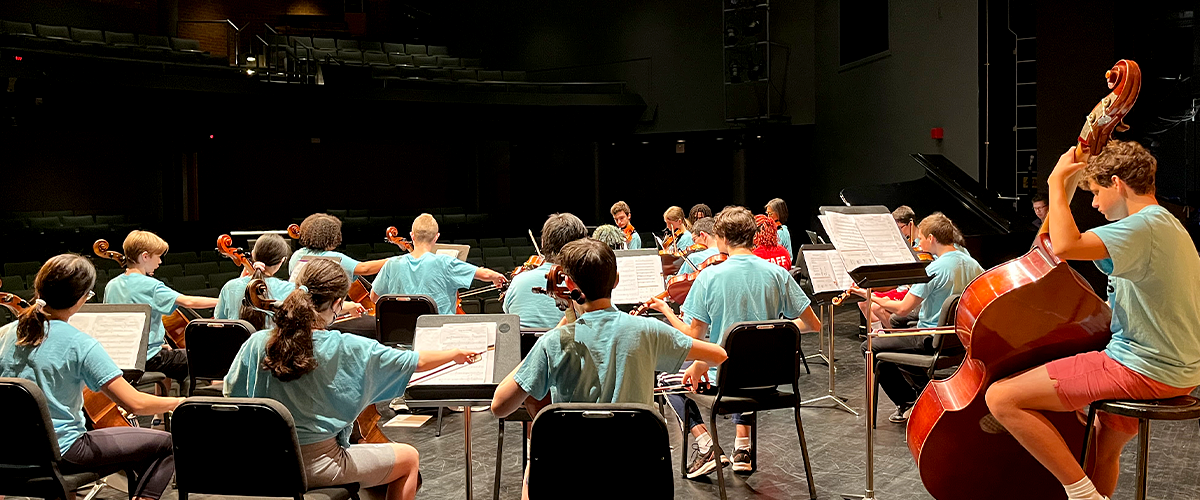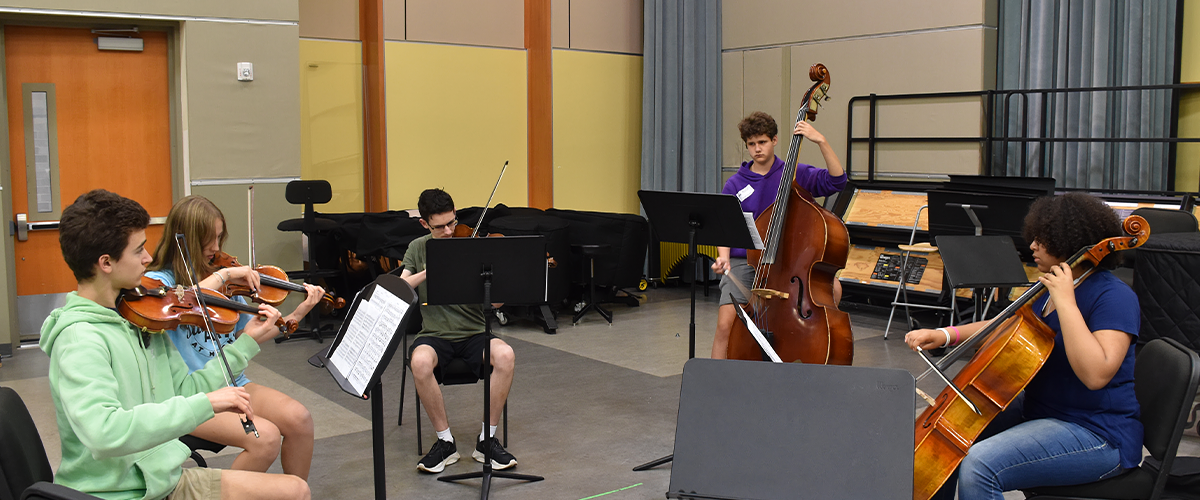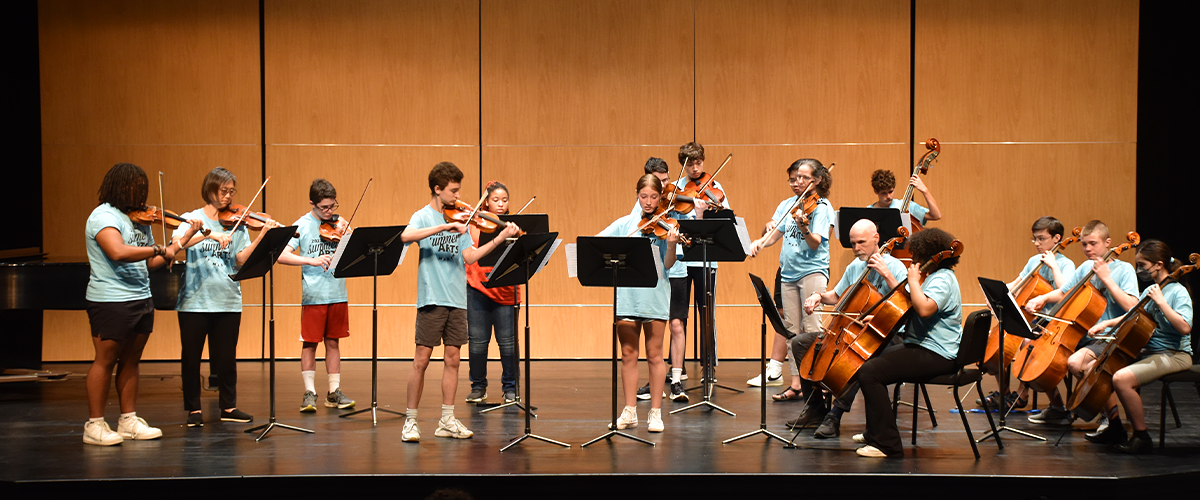Overview
The Mason String Camp is a week-long intensive program for violin, viola, cello, and bass players. Curriculum will focus on developing musicianship and communication skills that are necessary for small and large ensemble participation, including; private lessons, chamber music, technique classes, sight-reading, and orchestra.
Tuition includes lunch on campus Monday – Friday.
Participants will have the opportunity to work with faculty from the Reva and Sid Dewberry School of Music at George Mason University and will present a final concert at the end of the week.
Prerequisites
- Students should be at least 10 years old (at the time of camp)
- Required Experience: Students should have at least 2 years of experience in school or youth orchestra programs and/or at least 2 years of private lessons.
Curriculum
- Technique classes
- Chamber Music
- Green Orchestra (ages 10 through middle school)
- Gold Orchestra (high school)
- Individual Lessons (optional)
- Sight-reading
- Collaborative work with guest artists
Ages: 10-18
Dates: July 29 – Aug 2, 2024
9:00 am – 4:00 pm
Tuition: $695
Location: Mason Fairfax Campus, deLaski Performing Arts Building
Registration
After registration, a Seating Placement Audition is required of all students by June 1, 2024 (see Audition Process section below). This will determine the placement for orchestra seating, and appropriate placement into technique and other curricular activities.
Placement Audition Process (Due June 1, 2024)
Mason String Camp will use recorded solo and excerpts to determine the placement for orchestra seating, and appropriate placement into technique and other curricular activities. All applicants must prepare a solo of their choice and prepared excerpt(s), as described below.
All applicants MUST record excerpt #1. This excerpt is the minimum playing requirement. In addition to excerpt #1, applicants may opt to record excerpt #2, if their skill level allows. In addition to excerpts #1 & #2, applicants may opt to record excerpt #3, if their skill level allows.
Required solo
- Prepare a 2- to 3-minute solo that best demonstrates your ability level.
Required Audition Excerpt(s)
Violin Excerpts:
- Excerpt 1: Rossini/Gruselle, Barber of Seville, m. 93 – end, quarter = 132
- Excerpt 2: Bernofsky, Heart of Fire, m. 76 – m. 95, follow printed tempo markings
- Excerpt 3: Tchaikovsky, Serenade for Strings, Mvt. IV, m. 214 – m. 273, quarter note = 126
Viola Excerpts:
- Excerpt 1: Rossini/Gruselle, Barber of Seville, [14] – downbeat of [32], quarter = 132
- Excerpt 2: Bernofsky, Heart of Fire, m. 5 – 32, quarter = 96-120
- Excerpt 3: Tchaikovsky, Serenade for Strings, Mvt. IV, [G] – m. 279, quarter note = 126
Cello Excerpts:
- Excerpt 1: Rossini/Gruselle, Barber of Seville, m. 93 – end, quarter = 132
- Excerpt 2: Bernofsky, Heart of Fire, m. 9 – 33, quarter = 96-120
- Excerpt 3: Tchaikovsky, Serenade for Strings, Mvt. IV, [F] – [H], quarter note = 126
Bass Excerpts:
- Excerpt 1: Rossini/Gruselle, Barber of Seville, m. 9 – 28 quarter = 132
- Excerpt 2: Bernofsky, Heart of Fire, m. 1 – 22, quarter = 96-120
- Excerpt 3: Tchaikovsky, Serenade for Strings, Mvt. IV, [F] – [H], quarter note = 126
There are no expectations for students to perform all three excerpts. Mason String Camp places more importance on the quality of the excerpts, not on the number of submitted excerpts. Excerpts can be accessed in the application link.
Program Faculty
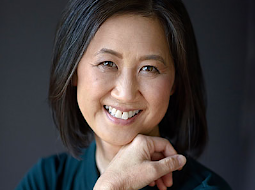
June Huang
Artistic Director & Violin Faculty
Read More
Prof. June Huang is the Director of Strings and Assistant Professor of Violin at the Dewberry School of Music. She teaches undergraduate and graduate courses in applied violin, chamber music, pedagogy, and string methods. Prof. Huang has a Master of Arts from the University of California at Santa Barbara where she was a member of the Young Artist String Quartet. She earned a Bachelor of Music in Performance from the Oberlin Conservatory and attended the Cincinnati College-Conservatory of Music as an undergraduate. Prof. Huang studied at the Meadowmount School of Music, Aspen Music Festival, Banff Centre for the Arts, and Kneisel Hall. Her primary teachers include Stephen Clapp and Ronald Copes.
Prof. Huang has performed with the National Philharmonic, Harrisburg Symphony, Richmond Symphony, Wolf Trap Orchestra, Washington Ballet Orchestra, and Amadeus Orchestra. She is a frequent chamber music collaborator and has appeared at the Staunton Music Festival, Red Lodge Music Festival, and Chamber Music Society of Central Virginia. A specialist on the baroque violin, Ms. Huang plays and records with Opera Lafayette, Four Nations, and REBEL Baroque Orchestra. Leadership positions have included concertmaster of the Washington Bach Consort and the Washington National Cathedral Baroque Orchestra.
Prof. Huang is certified by the Suzuki Association of the America and is a member of the initial cohort of Communicating Honor for Diversity. As a grant recipient from the Levine School of Music, she visited Matsumoto and studied violin pedagogy with Dr. Suzuki. Prof. Huang is an active clinician and was the Founder and Director of String Camp and Strings Plus at Levine Music in Washington DC for 27 seasons. She currently directs the Mason Community Arts Academy Strings Camp and High School String Intensive.
Professor Huang is a member of the Editorial Committee of the American String Teachers Association and a presenter at the ASTA National Conference for 2022 and 2023. Additionally, she will perform and present at the Midwest Clinic and at the state conferences of the Virginia Music Teachers Association and the Virginia Music Educators Association this season. Prof. Huang is studying the intersection of music education and citizenship, and she intends to complete a Masters Certificate in Contemporary Dispute Resolution at the Carter School for Peace and Conflict Resolution next May.
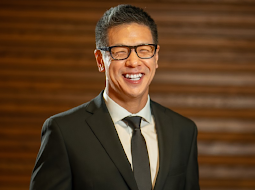
Dr. Soo Han
Orchestra & Activities Director
Gold Orchestra Conductor
Read More
Dr. Soo Han is the newly appointed Director of Orchestral Studies at the Reva and Sid Dewberry Family School of Music at George Mason University. He is also the Music Director of the Elkhart County Symphony Orchestra and a member of the Board of Directors of the Midwest International Band and Orchestra Clinic. In addition, he is a contributing editor for Hal Leonard’s Essential Elements for Strings, a D’Addario Orchestral Strings Artist, a Conn-Selmer Educational Clinician, and a program coordinator/faculty member with the Los Angeles Philharmonic’s summer Youth Orchestra program.
Prior to his appointment at George Mason University, Dr. Han served as the Director of Orchestral Studies at Baldwin Wallace Conservatory of Music in Berea, Ohio. He conducted the Baldwin Wallace (BW) Symphony Orchestra, the BW Opera Theatre, and led a successful performance tour with the BW Symphony Orchestra in addition to maintaining an active conducting studio.
An active conductor, Dr. Soo Han has appeared with professional orchestras throughout the country in addition to directing university orchestras. He is a frequent conductor for All-State, Regional, and Honor Orchestras throughout the U.S., appearing in over 30 states. He has also conducted internationally with orchestras in Austria, China, Thailand, and Australia. Dr. Han has collaborated with numerous artists, groups, and conductors such as Lynn Harrell, David Kim, and the Indianapolis Symphony Orchestra. He has produced multiple recordings of complete symphonies and has premiered several commissioned works for strings and full orchestras. He has presented workshops and clinics internationally and for national and state music conferences including the Australian String Teachers Conference, Maryborough National Australia Conference, Midwest Clinic, American String Teachers Association (ASTA) National Conference, NAfME National Conference, and the Ohio University Summer String Teacher Workshop.
Dr. Soo Han is a co-author, contributor, and managing editor for Teaching Music through Performance in Orchestra, Vol. 4, one of the leading orchestra pedagogical resources published by GIA. He is the past president of the Indiana chapter of the American String Teachers Association; the Indiana chapter was awarded the ‘Most Improved Chapter’ during his time as president. Having taught music in public schools for fifteen years, he is a passionate supporter of public school music programs and continues to remain active in instrumental classrooms throughout the country.
Dr. Soo Han received his Bachelor of Instrumental Music Education degree from Indiana University Jacobs School of Music and studied piano with Edward Auer. He received his Master of Science in Education from Indiana University School of Education, and his Doctorate in Orchestral Conducting from the Michigan State University – College of Music where he studied with Kevin Noe.
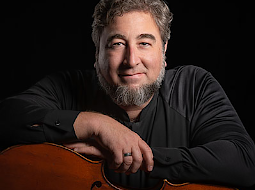
Gerald Fowkes
Green Orchestra Conductor
Read More
Gerald Fowkes, cellist and conductor, is a graduate of Louisiana State University where he graduated summa cum laude in Cello Performance. His former teachers and mentors include Dennis Parker, Loran Stephenson, Wesley Baldwin and Pamela Frame. He has participated in master classes with cellists Gary Hoffman, Aldo Parisot, Erling Blöndal Bengtsson, and Paul Katz, amongst others. In addition, he holds a Master of Music Education from Brigham Young University where he studied string pedagogy with Andrew Dabczynski and Samuel Tsugawa. A Northern Virginia native, Gerald is an alumnus of the American Youth Philharmonic and a past Virginia Emerson Scholar at the National Music Camp at Interlochen, Michigan.
From 2014 to the present, Mr. Fowkes serves as Director of Orchestras at Fairfax High School. From 2003-2014 he taught in Prince William County Schools and was the recipient of the 2014 Dale City Civic Association High School Teacher of the Year. In addition to his duties at Fairfax, he is conductor of the Young Artist Orchestra of the DC Youth Orchestra Program, and on the artist faculty as the Orchestra Director of the Greater Washington Suzuki Institute. From 2017-2020, Fowkes was Music Director and Conductor of the McLean Youth Orchestra. Prior to that position, he was on the conducting staff of the Youth Orchestras of Prince William from 2004-2017. He has had the distinct honor of guest conducting numerous honor orchestras throughout the Commonwealth of Virginia and is a frequent guest conductor at the annual JMU Spring String Thing.
Mr. Fowkes is currently a member of the George Mason University faculty, teaching applied cello, as well as courses in cello pedagogy and class strings. He is a frequent chamber music collaborator and a past chamber music fellow at the Hot Springs Music Festival and the Park City International Music Festival. A former member of the Baton Rouge Symphony, he performs frequently as a freelance cellist throughout the Baltimore/Washington metro area having performed with the Virginia, Fairfax, and McLean Orchestras amongst others. Mr. Fowkes maintains a private cello studio at his home where he resides with his wife and four children.
- MM Ed., String Pedagogy, Brigham Young University
- BM, Cello Performance, Louisiana State University
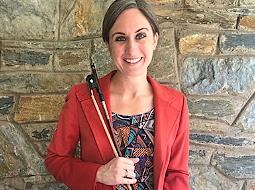
Dr. Jessica Powell Eig
Bass Faculty
Read More
Praised for her “natural expressiveness” (Montpelier Times Argus), Dr. Jessica Powell Eig has crafted a dynamic and varied career performing on double bass, violone and viola da gamba. In recent seasons she has appeared with Washington Bach Consort, New Orchestra of Washington, American Bach Soloists, Washington Concert Opera, Cathedral Choral Society, REBEL, ARTEK, North Carolina Baroque Orchestra, and Seraphic Fire, among many others. In 2018 she joined the faculty of Chamber Music Conference and Composers’ Forum of the East.
In addition to her work as a performer, Dr. Powell Eig is active as a teaching artist and clinician. In 2019 she served as a clinician for the Young Bassists program at the International Society of Bassists convention in Bloomington, IN. She regularly serves as guest lecturer in Double Bass Pedagogy at the University of Maryland. From 2013 to 2016 she was the director of the Viola da Gamba Society of America Young Players Workshop and her writing on classroom outreach has appeared in Early Music America. She maintains an active private studio and has received grants to support her music education projects from Early Music America, the Viola da Gamba Society of America, and the Lower Manhattan Cultural Council.
She received a pre-college diploma from Julliard, the BA in applied music/double bass from the Eastman School of Music and the MM from Cincinnati College-Conservatory of Music. In 2010, Dr. Powell Eig completed the DMA in double bass performance at SUNY-Stony Brook, as a student of Joseph Carver and Kurt Muroki, where her research focused on the music of Sofia Gubaidulina. Following the completion of her DMA she pursued further private study in historical bass with Rob Nairn. She studied viola da gamba with Christel Thielmann, James Lambert and Martha McGaughey.
As a committed advocate for the arts, Jessica shared her expertise as a grant-writer and fundraising consultant with many established as well as emerging arts organizations. From 2013 to 2015 she served on the Executive Committee of the Viola da Gamba Society of America as Membership Secretary, and she currently serves on the board of the Viola da Gamba Society of Greater Washington-Baltimore. Dr. Powell Eig is a member of the American Federation of Musicians, International Society of Bassists, and Early Music America.
Notes
- Please note that group classes are subject to cancellation if minimum enrollment is not reached.
- Be sure to check our policies and procedures regarding registration, withdrawals, refunds, and more for summer group classes.
- All students will receive a Welcome Letter via email at least 1 week before the class starts with all necessary details.
- Online registration closes 2 business days before the first class, however space may still be available. Please contact academy@gmu.edu for more information. A $10 late registration fee may apply.
- For additional information, please contact the Academy at academy@gmu.edu.

